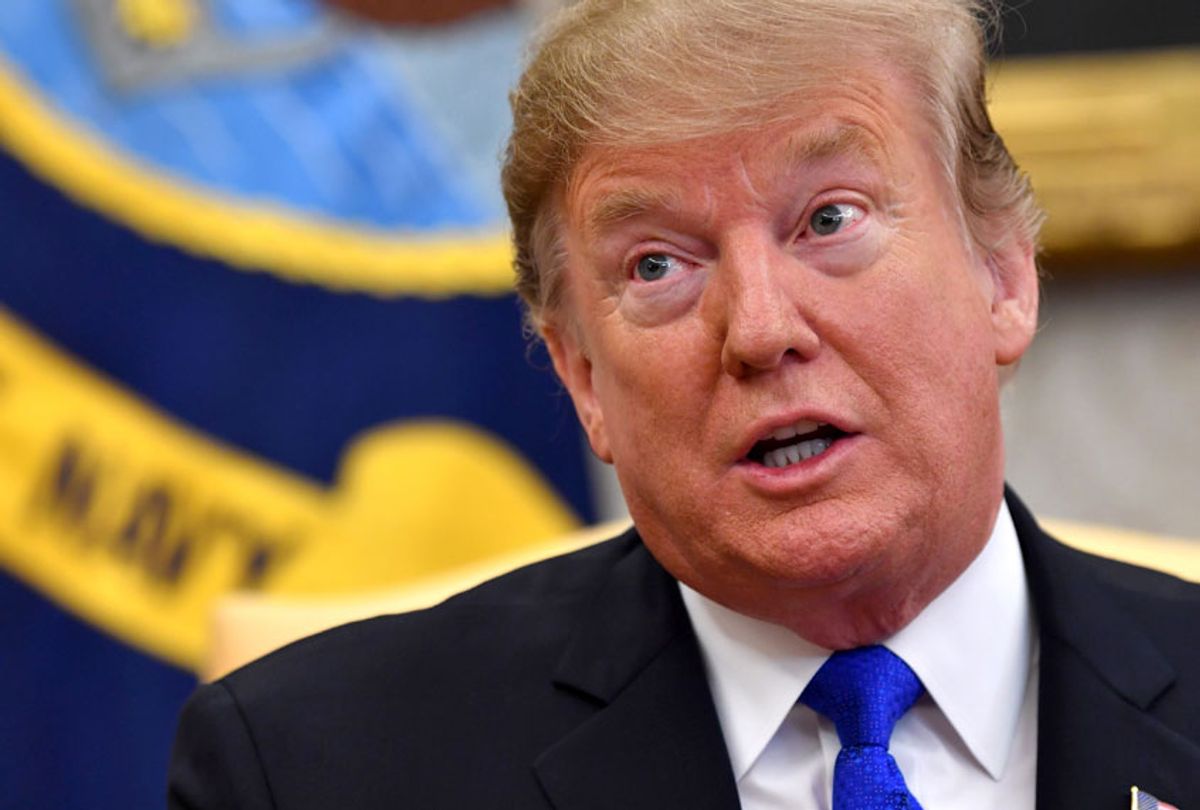President Donald Trump suggested his supporters are tougher than Democrats and if they actually play tough, things could get "very bad."
The commander-in-chief made the comments in an interview with the far-right news outlet Breitbart, in which he declared that the left in American politics play a more "vicious" political game than the right.
"You know, the left plays a tougher game. It's very funny," Trump claimed in the interview first published Wednesday. "I actually think the people on the right are tougher, but they don't play it tougher."
"I can tell you I have the support of the police, the support of the military, the support of the Bikers for Trump. I have the tough people, but they don't play it tough — until they go to a certain point. And then it would be very bad — very bad," he continued. "But the left plays it cuter and tougher — like with all the nonsense that they do in Congress . . . with all this invest[igations]. That's all they want to do is — you know, they do things that are nasty."
"Republicans never played this," the president concluded.
Trump's comments were widely condemned by political observers and analysts on social media.
"This is...a threat of fascist violence by the President ?" MSNBC host Chris Hayes tweeted Thursday.
Meanwhile, Greg Sargent, an opinion writer at the Washington Post, disagreed with Hayes. He tweeted, "Actually, no, it's not a threat. He's merely saying it *might* happen. And that would be very, very bad, so you'd better hope it doesn't! That's the whole point of the trick."
Conservative writer Jennifer Rubin said Trump's comments resembled those made by Italy's former fascist dictator Benito Mussolini.
Trump's interview with Breitbart was not the first time in which some of his remarks were perceived by critics to be encouraging violence toward his political enemies.
During a rally for then-Republican Senate candidate Josh Hawley last September, Trump said, "The Democrat[ic] Party is held hostage by activists, by angry mobs, Antifa, by deep state radicals and their establishment cronies . . . They're so lucky we're peaceful."
"Law enforcement, military, construction workers, Bikers for Trump . . . They travel all over the country . . . They’ve been great," Trump said at the time. "But these are tough people . . . But they’re peaceful people. And Antifa and all — they'd better hope they stay that way."
Trump said he would like to punch a protester in the face and see him carried out on a stretcher at a campaign rally in Las Vegas in 2016.
"The guards are being very gentle with him," Trump said at the time. "I'd like to punch him in the face, I'll tell you that." He then lamented — "We're not allowed to punch back anymore" — and hinted that he misses "the good old days" when the protester would be treated differently.
"You know what they used to do to a guy like that in a place like this?" Trump asked the crowd. "They'd be carried out on a stretcher, folks."
Protesters regularly interrupted Trump's rallies during the presidential campaign. At an event in Iowa in 2016, Trump told his supporters he would pay their legal fees if they engaged in violence against protesters causing any trouble.
"If you see somebody getting ready to throw a tomato, knock the crap out of them, would you? Seriously, OK? Just knock the hell . . . I promise you I will pay for the legal fees. I promise. I promise," Trump said.
In 2015, Trump told Fox News a Black Lives Matter activist who interrupted his rally was "so obnoxious and so loud" that "maybe he should have been roughed up."
Throughout his tenure in the White House, Trump has also taken aim at journalists and their reporting, frequently slamming unfavorable coverage of him as "fake news" and declaring the press to be the "enemy of the people." At times, Trump has even appeared to applaud violence against the press.
"Any guy that can do a body slam — he's my kind of guy," Trump said last October while campaigning for a Republican candidate for Congress, Greg Gianforte, who pleaded guilty to attacking a journalist in 2017. "I had heard that he body-slammed a reporter . . . and he was way up. And I said, 'Oh, this is terrible. He's going to lose the election.' Then I said, 'I know Montana pretty well.' And I said, 'I think it might help him.' And it did."
In February, the White House Correspondents' Association called on Trump to make it "absolutely clear to his supporters that violence against reporters is unacceptable."
The White House, meanwhile, has claimed Trump "condemns all acts of violence against any individual or groups of people — including members of the press."



Shares